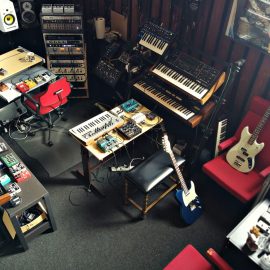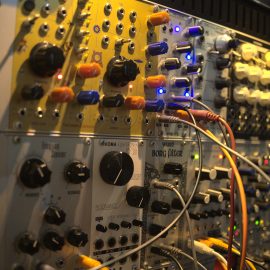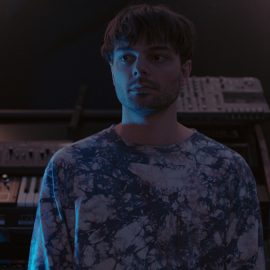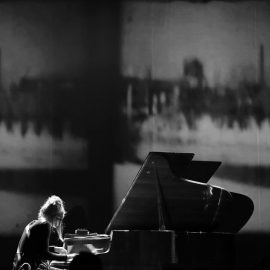Can you tell us how you got involved in composing, and what was your very first piece of gear?
I got into music and composition as I wanted to recreate the emotions I was feeling and experiencing while I was reading books or watching certain movies. I was into punk and metal, pretty much like every teenager of my generation, and I was playing in a couple of bands, but I got quickly bored as I couldn’t stand to play the very same music every time. I have a more jazzy approach, and I’m into themes that develop differently every time, according to the context. I need to explore. I couldn’t mentally survive doing the same thing for five years. The first sound tools I had were a Hofner guitar and a self-built distortion pedal.
How many different studio iterations have you gone through, and what does your final setup look like right now?
Too many. A heavy metal setup, tape loops, found objects setup, analog synths, samplers and machines, the digital realms, the Mac DAW, and finally, back to machines. I have a Mac, but I mostly use it for recording sessions and editing. Over the years the computer became a tape recorder with great editing options, I don’t spend anymore my time fiddling among thousands of files and possibilities unless I need to deliver quick track demos to a client for advert music or documentary sounds. I went back years ago to machines. I mainly use Elektron and Erica Synth tools, and I have a lot of small noise boxes and pedals… and my Korg MS-20 from 1980.
Tell us about your favorite piece of hardware.
Without any doubt, the Korg MS-20. It’s a stunning machine, never been serviced, perfectly working, and sounding like nothing else. The bass sounds I create with that synth are amazing, and the oscillators have a kind of aggressive but silky sound. I also love the Elektron Octatrack as well as Erica Synth Perkons. These are my favorites, along with my baritone aluminium guitar, which was built by Nude Guitars. I like instruments I can play. I tend to avoid click-and-drag situations as I need the physical touch.
And what about the software that you use for production?
I alternate DAWs depending on what I am working on. Ableton Live is fast and reliable for composing on the spot. I mainly use it to score music for images. Pro Tools is great for audio editing, and still unbeatable when it comes to working on complex recording sessions. Logic Pro, especially on the iPad, gives me the flexibility to work on a mobile platform and then more files to the Mac for further work. I don’t use a lot of plugins, mostly UAD ones. They sound amazing and come with stunning audio interfaces.

Is there a particular piece of gear that you’re just dying to get your hands on, and do you think one day you’ll have it?
I like the Erica Synth techno system. Not that I do techno, but I like the flexibility of it. Maybe one day.
Can you please share some aspects of sound design in your work?
I process a lot of sounds through reverbs and delays and squash them with compressors and limiters. In this way, I create the root waves for pads and basses. I load the raw material into samplers, hardware or software and use it to program anything.
Any particular new techniques that you tried out for your new album?
Limits. I forced myself to work with less. The album with Christopher Chaplin is entirely created with an Elektron Analog Four MKII. 4 tracks, and processing. The more time passes, the more I’m into using a bare minimum of everything. Sounds bloom in this way, not layering tons of materials. I never could stand piling up sounds or over-arranging.

What does your live setup look like, and what do you bring with you when you travel for an extensive tour?
It depends on which project I’m bringing on stage. My latest setup is an Octatrack, a Blackbox, Erica Synth Bassline, Zen Delay, an iPad, an audio/MIDI interface, and a MIDI controller. Sometimes, I add a Teenage Engineering OP-1 or an IK Multimedia Uno Synth Pro. If I’m playing as a guitar player, things radically change, but the above is what I bring also for a long tour. Sometimes, I’m lucky enough to have space to bring the Erica Synth Perkons. I always try to fit everything in a trolley or a backpack as I have had so many horrible experiences with airlines and luggage handling that I want to have my equipment with me at all times as well as I do not rely on backline requests. I feel comfortable only when I’m self-contained, and I can play anywhere at any moment.
What is the most important environmental aspect of your current workspace, and what would be a particular element that you would improve on?
Working at home. I like having an external studio, but over the years, I realised that working at home is the most creative and natural situation for me. I need to be in my environment, with my books and records. I like to record in studios, but once the recording is done, I get the session files, and I go back to my nest. I’d like to have more space, that’s for sure, but I can’t complain. I adapt pretty well to anything.

What can you tell us about your overall process of composition? How are the ideas born, where do they mature, and when do they finally see the light?
They mostly bloom from images or sentences I read. I have lived for 30 years with a video artist and graphic designer, so images are a daily occurrence in my existence. The beginning is usually a sound, most of the time, not even a melody, just sounds. I work on subtraction, meaning I first layer loads of material and melodies, and once I reach the point when I can’t stand it anymore, I start to subtract track after track, leaving only what’s necessary or giving me some sort of emotional involvement. The final part, the mix, is creative in the very same way as the beginning. The mixing board is an instrument tool, not just a mixer, so the last part is mostly experimenting with effects and levels to find the magic. I like dynamics, but I can’t stand the “brick effect”, where music is so compressed or full that all the shades in sounds and feelings disappear.
After the piece is complete, how do you audition the results? What are your reactions to hearing your music in a different context, setting, or sound system?
I let music “age” as I need to detach from it for a while. At least a couple of weeks. Only then do I go back to it for a final listening. I always find something that I want to change here and there. Once done, it stays again sometime away from me, and finally, I listen to it in various situations: headphones on the bus or subway, on a plane. In a hotel room. My music must work as a possible soundtrack. Hundreds of potential movie scenes or individual stories. If I have the chance, I listen to it in different studios or systems, but the most important aspect is the soundtrack approach. If it doesn’t tell a story, it’s not working, at least for me.

Do you ever procrastinate? If so, what do you usually find yourself doing during those times?
Unless I have to deliver music for an advert, film or installation, where you must stick to the production schedule, I tend to pause sometimes. I usually use that time to study new machines, go to exhibitions, or cook, which is my second passion.
What gets you inspired?
Images, situations, individual stories, tragedies, silences, dark alleys, words I hear by chance on public transportation, trains leaving from stations, disasters, nature, and books. Anything that gives me emotions, and is not necessarily sweet. I’m very often triggered by rage and hard situations. I must be moved in some way, it doesn’t matter if for good or bad, positive or negative as long as I’m emotionally involved.

And finally, what are your thoughts on the state of “electronic music” today?
I do not know. I go in waves and periods. I listen to everything and often I don’t want to know what I’m listening to avoid any kind of influence. I like KMRU, Iggor Cavalera, Camilla Pisani, Shedir, Kevin Martin, Ramleh, and many more. The list changes every day. I listen to a lot of drone music or hyper-violent projects. I’m not comfortable in the grey areas I always need contrast. I love to go on Bandcamp and surf… discovering unknown artists.








